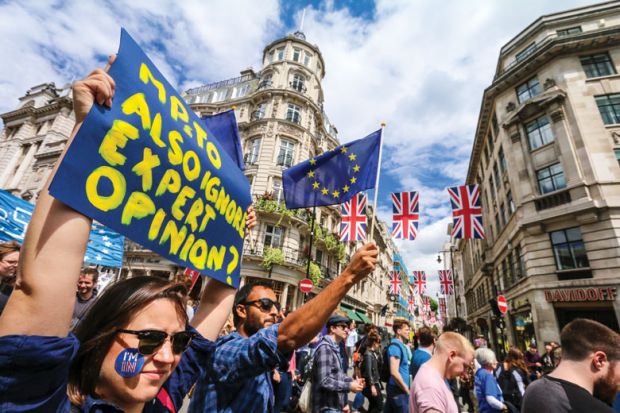How can the experts so often derided by populists ensure that their insights make an impact on policymakers and the public?
That was the question raised by Dame Anne Glover – vice-principal for external affairs at the University of Aberdeen (and a former chief scientific adviser both to the Scottish government and to the president of the European Commission) – in a lecture at the Royal Society on 17 October.
Titled “And Then They Came for the Experts”, it was part of the annual Science and Civilisation lecture series organised by the Council for At-Risk Academics (Cara), an organisation set up in 1933 for “the relief of suffering and the defence of learning and science” when Germany’s Nazi government began to expel hundreds of leading scholars.
Dame Anne deplored the contempt for scientific expertise revealed by Donald Trump’s claim that global warning was “created by and for the Chinese” and Michael Gove’s “uninformed, foolish and dangerous” comment that “Britain has had enough of experts” in the lead-up to the European Union referendum.
In reality, she went on, expertise is essential: “Evidence allows us to tackle global challenges in a rational way. Without generating knowledge there are no jobs and no economy.” Even more crucial was that fact that although “scientific knowledge evolves over time, it doesn’t change from one government to the next”.
Fortunately, she said, scientists still enjoyed a good deal of public support, referring to an Ipsos MORI poll in 2015 that ranked academics after only doctors, teachers and judges as the most trusted professions – just above hairdressers and well above politicians. Yet it was still essential to ensure that trust was used effectively.
Drawing on her own experience, Dame Anne noted that “you don’t have many friends as a chief scientific adviser – your job is to challenge and question. You just have to be lonely in government and not ‘go native’. The danger is when you are made to feel like ‘a very special person’ or ‘one of us’.”
Other scientists could also find ways to make a difference and “ensure that evidence matters”.
Dame Anne urged them to “raise [their] voices when science or evidence is misused”, to “communicate [what] we do and why” and to “demonstrate [their] relevance to a broad audience”. If they wanted to be listened to, it was generally more sensible to “offer options for action rather than claiming to have the ultimate solution”.
“It takes a lot of effort to generate scientific evidence,” Dame Anne concluded, “so we should ensure we make the best use of it.”
Register to continue
Why register?
- Registration is free and only takes a moment
- Once registered, you can read 3 articles a month
- Sign up for our newsletter
Subscribe
Or subscribe for unlimited access to:
- Unlimited access to news, views, insights & reviews
- Digital editions
- Digital access to THE’s university and college rankings analysis
Already registered or a current subscriber? Login









